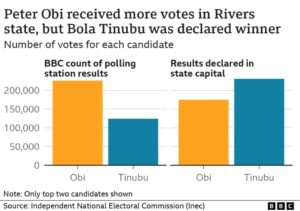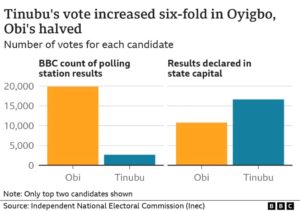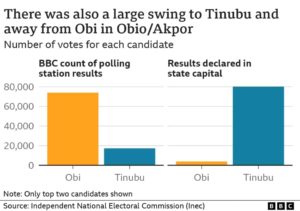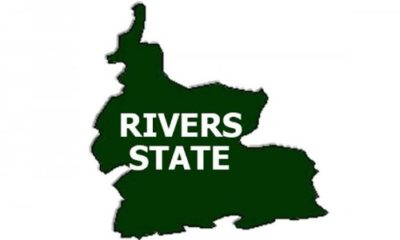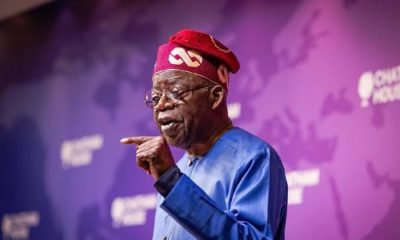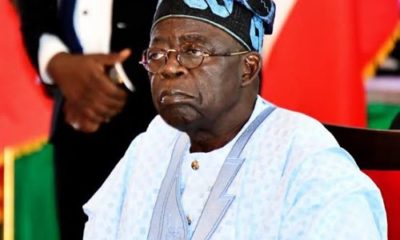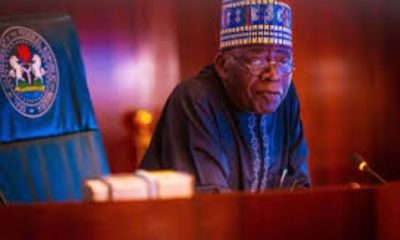Politics
BBC Exposes Election Discrepancies In Rivers State Presidential Election Result
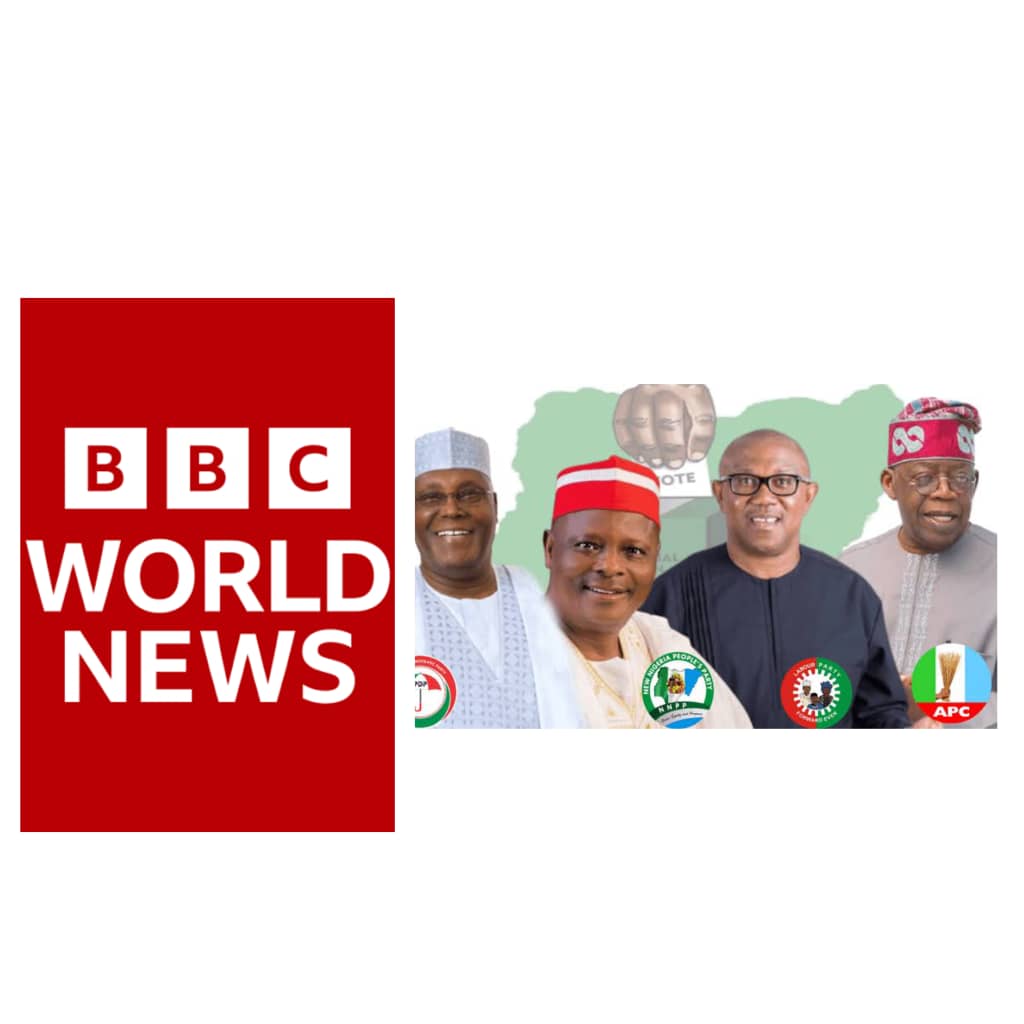
An investigation conducted by the BBC has revealed potential indications of manipulation in Nigeria’s presidential election results.
Bola Tinubu, the declared winner, is scheduled to be inaugurated on 29 May; however, the opposition is contesting this outcome.
The BBC’s findings have identified notable irregularities in Rivers state, a crucial contested region, although these irregularities are not substantial enough to alter the overall national result of the election that occurred in February.
Additionally, concerns have arisen regarding the identity of an election official who announced certain unexplained results.
According to BBC, After meticulously analyzing the voting tally sheets from more than 6,000 polling stations in Rivers state, where numerous complaints from the opposition were concentrated, a discrepancy has emerged.
They alleged that the official results in this particular state indicated a decisive majority in favor of Bola Tinubu from the ruling All Progressives Congress (APC).
However, upon their own calculations, it appears that Peter Obi of the Labour Party (LP) had garnered the highest number of votes in the state, surpassing Tinubu by a significant margin.
The investigation has alleged that there was a notable increase of approximately 106,000 votes in Mr. Tinubu’s official declaration compared to the tally obtained from our polling station analysis.
This increase nearly doubled his overall vote count in the state. Conversely, Mr. Obi’s vote count had decreased by over 50,000 in comparison.
They emphasized that despite conducting a thorough search on the election website for all 6,866 polling stations in Rivers state, complete results were not obtainable. Some results were incorrectly uploaded or missing even after a month had passed since the polling date.
Additionally, for approximately 5% of the polling stations, the photos of the tally sheets were too blurry to decipher according to the investigation.
Furthermore, the investigation uncovered that in an additional 17% of polling stations, no results were available at all. This could be attributed to various reasons, such as security concerns or the failure of voting materials to arrive. Technical difficulties also hindered officials from uploading the required documents.
It is evident that the final official results would have included more polling stations than those considered in the BBC investigation.
However, these additional tally sheets would have increased the vote totals for each party, rather than decreasing them.
Surprisingly, the investigation revealed that there was a significant decline in votes for Peter Obi’s Labour Party in Rivers state as indicated by the official result.
The question remains: How can the sharp decrease in Peter Obi’s votes, as reflected in the official result, be explained given the circumstances?
Two specific areas drew notable attention during the investigation. The first was the Oyigbo local government area where the officially announced results indicated that Bola Tinubu’s vote count was six times higher compared to the BBC’s tally from the polling stations and In contrast, Peter Obi’s votes had been reduced by half according to the official results.
The second local government area that the BBC investigation identified as having major discrepancies was Obio/Akpor, located in close proximity to Oyigbo. The investigation revealed that the official result for Mr. Tinubu showed a vote count of 80,239, while the BBC counted just 17,293 votes from the polling station tallies.
Conversely, the official count for Mr. Obi was only 3,829 votes, whereas the BBC’s tally sheets indicated a staggering 74,033 votes for him.
According to the BBC, all the polling station sheets were collated at the local government (LGA) headquarters.
During the investigation, the BBC team discovered an official election document that contained the collated votes for the Oyigbo area.
The document was signed by an election official and several party agents, indicating its authenticity and credibility.
According to the investigation, Multiple photographs of the document were taken and shared on various social media accounts. The numbers recorded in this document closely aligned with the BBC’s own tallies for the two leading candidates, Obi and Tinubu.
It further States that the document was likely one of the 23 collation sheets from the local government areas (LGAs) in Rivers state, which were taken to the state capital, Port Harcourt, for the official declaration of results.
According to them, The official announcement took place on 27 February and was broadcast live on television.
Dr. Dickson Ariaga, the election official from Oyigbo, introduced himself and stated that he worked for the Federal College of Education in Omoku.
Although the word “Omoku” on the recording is unclear, it is important to mention that there is only one Federal College of Education in Rivers state.
Dr. Ariaga proceeded to read out the results for each party in alphabetical order, including the smaller parties. This recording provides additional evidence regarding the announcement of the results in Oyigbo.
During the live announcement, according to BBC, it was observed that the numbers mentioned by Dr. Ariaga did not align with the figures recorded on the collation sheet obtained by the BBC.
Specifically, when he reached Mr. Tinubu’s APC, instead of stating the figure of 2,731 as seen in the photograph of the sheet, he announced a significantly higher number of “16,630.” Similarly, for Mr. Obi’s party (LP), the announced figure differed from the number on the sheet.
Instead of the recorded 22,289 votes, Dr. Ariaga declared “10,784,” which resulted in more than halving Obi’s vote count.
Despite the BBC’s efforts to obtain further information and clarification, the electoral commission declined to provide the details of Dr. Ariaga or facilitate an interview with him on the matter.
However, the BBC managed to speak with the election official who was seated next to Dr. Ariaga during the announcement. Unfortunately, she stated that she was not authorized to speak to the press.
To gather more information, a reporter from the BBC was sent to the Federal College of Education in Omoku, located approximately two hours north of Port Harcourt, where Dr. Ariaga claimed to work during his introduction. The Deputy Provost, Moses Ekpa, was interviewed by the BBC.
He stated that based on their records, including payroll and human resources, there is no individual by the name of Dr. Ariaga in their system, and they have no knowledge of such a person being associated with the institution.
He said “From our records, both from our payroll and from our human resources, there is no such a name in our system and we don’t know such a person.”
In an attempt to track down Dr. Ariaga, the BBC conducted a search on social media platforms and came across another Facebook account bearing the name Dickson Ariaga, which listed Port Harcourt as the location.
To verify the connection, the BBC utilized Amazon Rekognition software to compare an image from this account with television footage of Dr. Ariaga. The software indicated a match of 97.2%, suggesting a high probability that they are the same individual.
Despite attempts to contact Dr. Ariaga through this Facebook account, he did not respond to the messages sent by the BBC. However, the BBC managed to reach out to some of his Facebook friends in an effort to gather more information.
Eventually, they were able to speak to a man who claimed to be a relative of Dr. Ariaga. Initially, he expressed willingness to assist the BBC, but later on, he did not return their calls, leaving the investigation with unresolved leads.
Upon presenting these findings to Nigeria’s Independent National Electoral Commission (INEC), the BBC received a response from Johnson Sinikiem, Inec’s regional spokesman in Port Harcourt. Sinikiem explained that due to a “gross shortage of time and personnel,” there were instances where individuals were employed without proper verification of their identity documents.
Regarding Dr. Ariaga specifically, Sinikiem acknowledged that if Ariaga had presented himself as a lecturer from the college in Omoku, but it turned out to be false, then he would be considered dishonest.
He said “If he had presented himself as a lecturer from [the college in Omoku] and it’s otherwise, then he is dishonest.”
In addition to seeking a response from Inec’s regional spokesperson, the BBC also approached Inec’s headquarters in Abuja regarding the discrepancies found in the results in Rivers state. However, the response received was that they were unable to comment on the matter due to ongoing legal challenges.
The case highlighted by the BBC investigation in Rivers state is just one example that raises concerns about potential manipulation of election results.
However, the search for Dr. Ariaga continues as the BBC awaits his response to the findings presented in their report. Obtaining his perspective and clarifications could provide valuable insights and contribute to a better understanding of the situation.
@BBC News (World)
Politics
Osun State Denies Borrowing N10bn

The Osun State Government has denied media reports that she borrowed the sum of sum of N10 billion.
The government made the denial in a statement in Osogbo on Monday under the signature of the Spokesperson to the State Governor, Olawale Rasheed.
It read, “Our attention has been drawn to a report by the Nation Newspaper alleging that Governor Ademola Adeleke has taken a loan of over Ten Billion Naira. We strongly affirm that the story is not true.
“Governor Adeleke has not at any point since assuming office taken any loan either through a resolution of the State Executive Council or that of the State House of Assembly.
“The ongoing multi-billion-naira infrastructure projects across Osun State have no loan components. They are all being financed through state resources. The dualisation of roads, the overhead bridges, the school and health centres upgrades, and several roads projects are being funded through special project account created by the State Government.
“What the newspaper report referred to as loans taken by Governor Adeleke were World Bank Development financing which were inherited from the previous administrations and which are national projects operated through the Nigeria Governors’ Forum, the National Economic Council among others.
“Such programmes of World Bank and multilateral institutions development includes Ilesa Water project; establishment of Osun Investment Promotion Local Business Offices across nine Federal Constituencies; O-Cares For Agricultural Support Services; World Bank On Saber For Development Of PPP; World Bank On Saber For Establishment Of Osun Investment Promotion One-Stop-Shop.
“Others include World Bank On O-Cares Projects For Coordination Of State Cares (O-Cares) Activities; World Bank On Rural Access And AgriculturalMarketing Project (Raamp 3) for Rural Development Projects; World Bank For Community And Social Development Project On O-Cares; World Bank For Labour Intensive Public Workfare On O-Cares and World Bank For Social Support Programme (Cash Transfer To Indigent Elderly On Osun Covid-19 Action Recovery And Economic Stimulus) – (O-Cares).
“As can be seen from the above, all the projects are related to the World Bank country programme for Nigeria which targets subnational entities using the mechanism of the Nigerian Governors Forum and the National Economic Council. Previous Governors in Osun State joined in the implementation of the projects which Governor Adeleke inherited.
“In line with his principle of continuity of policies favorable to the public, the Governor sustained the projects as Osun cannot opt out of a national scheme in which all states of the Federation are involved.
“No responsible government will abandon a series of World Bank projects which are already household names across the Federation and which have benefited so many residents.
“We reaffirm again that Governor Adeleke has not borrowed a kobo since assuming office. Inherited liabilities and contracts cannot be tagged on the Governor of the Year on Infrastructure.”
Politics
LP Expresses Fury As NLC Names Interim Chairman For Gombe
The Lamidi Apapa wing of the Labour Party (LP) has raised objections to the Nigeria Labour Congress’s (NLC) appointment of an interim chairman for the party in Gombe State, labeling the decision unacceptable.
Additionally, the Julius Abure faction expressed ignorance of the appointment, citing the presence of an existing substantive state chairman in Gombe.
This development exacerbates the existing rift between the NLC and LP leadership, with recent tensions culminating in accusations from the NLC against LP National Chairman Julius Abure of unilateral control over the party’s affairs.
Under the leadership of its National Secretary, Chris Uyot, the NLC political commission intervened by endorsing Sani Abdulsalam, the former Gombe LP Chairman reportedly ousted by the Julius Abure-led National Working Committee for alleged anti-party conduct.
Uyot announced Abdulsalam’s appointment to oversee the party’s affairs until local government elections are held in the state.
A copy of the letter detailing this decision was sent to the Independent National Electoral Commission, Department of State Services, Gombe State Police Command, and the Secretary to the Gombe State Government.
The letter partly read, “To whom it may concern. We bring you fraternal greetings from the NLC political commission. We write to communicate the appointment of Alhaji Sani Abdulsalam as interim Chairman of LP in Gombe.
“His appointment is for the period up till the conduct of local government elections in Gombe State. Thereafter, a more substantive state transition committee of the Labour Party in Gombe State will be constituted.
“While we look forward to your cooperation, please accept the renewed assurance of our highest esteem.”
In a telephone conversation on Sunday, Abayomi Arabambi, the spokesperson for the Apapa faction, distanced themselves from the arrangement.
Arabambi emphasized that the NLC lacked the authority to enforce any individual on the party.
He stated, “The NLC political commission is not a party. We intend to take very drastic constitutional action against them. Already, we have warned them not to disobey the constitution of our party. They are merely a pressure group.
“No section of the LP constitution ceded the control of the party to the NLC or TUC. Furthermore, it is rather unfortunate that while some well-meaning members of the party are striving and making attempts to steer the ship of the nation on the path of growth and genuine development towards the repositioning of our party for victory in 2027, the NLC and its political commission are determined to destroy, tear down and demolish the party on the quest for personal aggrandisement.”
The National Publicity Secretary of the LP, Obiora Ifoh, echoed similar sentiments.
He affirmed that the LP already had a legitimate state chairman in Gombe and revealed that the Abure-led NWC was not informed about the recent development.
Ifoh clarified that Abdulsalam, the endorsed figure, was previously removed from his position as state chairman due to alleged anti-party actions.
He stated, “We are unaware of this development as the Labour Party maintains its leadership structure in Gombe State. We have LP chairmen established in all 36 states and the FCT. In Gombe, we are already working with a chairman recognized by INEC.”
“Anybody can come out to claim he appoints somebody. Just like INEC, we are not aware of it. The so-called appointed person, Abdulsalam, was a former chairman disengaged by LP for anti-party activities.
“A new leadership was elected into office after his exit. But because of the conflict we had with the NLC, the same man went around to congress and they recognised him.
“However, I think it is a mere recognition and not an appointment in the true sense. But we are not interested in joining issues with anybody in the media. For now, we are gradually working towards resolving the crisis between LP and NLC.”
Politics
SERAP Sues 36 Governors, Wike Over Trillion-Dollar Loans
The Socio-Economic Rights and Accountability Project (SERAP) has taken legal action against the governors of the 36 states of Nigeria and the Minister of the Federal Capital Territory, Nyesom Wike, for allegedly failing to disclose and publish the details of loans totaling N5.9 trillion and $4.6 billion obtained by their respective states and the FCT.
The lawsuit, filed under suit number FHC/ABJ/CS/592/2024, was lodged on Friday at the Federal High Court in Abuja by SERAP’s legal team consisting of Kolawole Oluwadare, Kehinde Oyewumi, and Valentina Adegoke.
In a statement released on Sunday, SERAP urged the court to compel the governors and Mr. Wike to provide an account of the loans and publish the loan agreements, as well as the locations of projects financed by the loans.
The lawsuit follows SERAP’s previous demand, outlined in a statement issued by the organization’s Deputy Director, Kolawole Oluwadare, on March 31, 2024, which was directed to the 37 respondents.
Kaduna State Governor, Uba Sani, expressed concern over the substantial debt inherited from his predecessor, Nasir El-Rufai, on May 29, 2023, stating that the state is now struggling to meet financial obligations such as salary payments.
Sani disclosed that his administration inherited a total of $587 million, N85 billion, and 115 contract liabilities from the previous governor.
In its latest statement, SERAP called upon the court to compel the governors and Mr. Wike to involve the Economic and Financial Crimes Commission and the Independent Corrupt Practices and Other Related Offences Commission in investigating the expenditure of all loans acquired by their respective states and the FCT.
In the suit, SERAP is arguing that “it is in the public interest to grant the reliefs sought. Nigerians have the right to see and scrutinise the loan agreements and know the details of how the domestic and external loans obtained by the governors and FCT minister are spent.
“Opacity in the spending of the loans obtained by the governors and Mr. Wike would continue to have negative impacts on the fundamental interests of the citizens.”
The statement highlighted concerns that numerous states, including the FCT, allegedly utilize public funds, potentially including loans, to finance unnecessary travel, purchase luxury vehicles, and support extravagant lifestyles of politicians.
It further asserted that there are purported mismanagement issues regarding public funds, including both domestic and external loans obtained from various institutions and agencies.
SERAP stressed the necessity of transparency in loan spending, emphasizing its significance in enhancing accountability, curbing corruption, and fostering trust in democratic institutions, ultimately aiming to bolster the rule of law.
The statement also emphasized that state governors and the FCT minister cannot use the excuse that the Freedom of Information Act does not apply to their jurisdictions.
It asserted that legal obligations to disclose the requested information are imposed by both the Nigerian Constitution and the African Charter on Human and Peoples’ Rights.
Although no hearing date has been set for the suit, SERAP lamented that the country’s high poverty rate, underdevelopment, and lack of access to public goods and services are attributed to years of alleged corruption and mismanagement of public funds, including loans obtained by states and the FCT.
SERAP cited the Debt Management Office, stating that the combined public domestic debt of Nigeria’s 36 states and the Federal Capital Territory amounts to N5.9 trillion, while the total public external debt stands at $4.6 billion.
However, SERAP expressed concerns that both domestic and external loans obtained by states and the FCT are susceptible to corruption and mismanagement.
As a result, the respondents are urged to prioritize transparency and accountability in the utilization of these loans to mitigate the risk of corruption and mismanagement.

